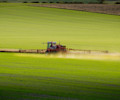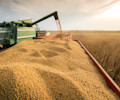The largest dairy producer in the US this week filed for bankruptcy. Dean Foods had reported net losses in seven of its last eight quarters in the latest reminder to investors of the risks in the fast-changing animal agriculture sector.
There are several factors behind the company’s decline, including higher prices of raw milk and greater competition, but perhaps the most significant for forward-looking investors is the declining consumption of dairy milk.
Per capita milk consumption in the US has slipped more than 40% since 1975. Dairy milk sales plunged 15% from 2012 to 2017, according to Mintel, while non-dairy milk sales were up 61% over the past five years. This growth has been partly driven by the adoption of substitutes such as almond milk by major chains like Starbucks.
Plant-based milk alternatives now account for 13% of retail milk sales in the US. This figure is expected to grow as consumers increasingly factor climate considerations in to their consumption choices.
How diverse is enough?
Investors now accept that one of the key ways meat and dairy companies can protect themselves from such risks is to diversify their product portfolios. Dean Foods’ did make some attempts in this direction; in 2017 the company purchased a majority stake in Good Karma Foods, which sells flaxseed-based milk and yogurt, and last year it bought Uncle Matt’s Organic, a maker of probiotic-infused juices and fruit-infused waters.
But it did not go far enough for diversification to be successful. Last year it still derived 67% of its sales from dairy milk, according to its annual report. Indeed, recent non-dairy acquisitions followed a period in which the company sold off other brands, like Silk and Horizon Organic, increasing its dependence on its core business. In what looks like a strategic error, those brands are now owned by Danone, whose CEO expects plant-based yoghurts to gain parity with traditional dairy products within 10 years.
Stretching the limits of consolidation
The decline of Dean Foods could benefit other dairy producers’ market share, especially Dairy Farmers of America, a 14,000-member co-op with which Dean is currently in “advanced discussions” about a potential sale.
But many of the problems faced by Dean Foods are endemic to the industry. Indeed the co-op’s own net sales shrank by $1 billion from 2017 to 2018.
Dean is also itself a product of consolidation. It was bought by Suiza Foods in 2001, which also bought several other milk producers. There is a limit to how far consolidation and cost savings can stave off sectoral decline.
A gathering storm
The FAO estimates that the global dairy sector contributes around 4% of total global anthropogenic GHG emissions, with the livestock sector as a whole responsible for over 14%. Moreover, many of the meat and dairy industries’ problems are set to deepen with climate change and further environmental pollution.
Our Appetite for Disruption report found that capital markets are starting to pay attention to the sector’s unique vulnerability to the physical impacts of climate change. Indeed, floods and droughts have already increased feed price volatility from the American Midwest to Australasia, costing these regions over $1 billion last year.
Looking to the future, the IPCC has warned that climate change will impact the dairy sector through reduced water availability, lower milk yields, and higher incidence of disease and mortality.
Our work suggests that major producers have yet to meaningfully address these climate-related risks. In particular, our Coller FAIRR Index found that
Over 70% of major publicly-listed dairy companies have not set targets to reduce non-mechanical emissions, which make up 78-99% of dairy emissions
Five out of six companies are not addressing deforestation risks linked to soy used as feed
Most (86%) dairy companies are not adequately addressing or managing water scarcity risks in animal farming
Companies that remain heavily dependent on intensive farming of animals will remain exposed to these ESG risks – as will their investors. In Dean Foods’ case, this includes lenders like Rabobank who have stepped up to provide debtor-in-possession funding to keep its operations running so far.
The story of Dean Foods’ decline is this: For diversification of product ranges – or investment portfolios – to be successful, it must occur at a sufficient scale to outweigh the growing risks of exposure to meat and dairy.
FAIRR insights are written by FAIRR team members and occasionally co-authored with guest contributors. The authors write in their individual capacity and do not necessarily represent the FAIRR view.











